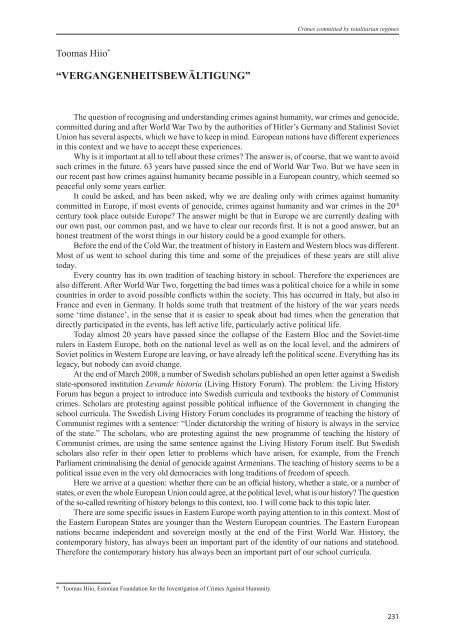crimes committed by totalitarian regimes - Ministrstvo za pravosodje
crimes committed by totalitarian regimes - Ministrstvo za pravosodje
crimes committed by totalitarian regimes - Ministrstvo za pravosodje
You also want an ePaper? Increase the reach of your titles
YUMPU automatically turns print PDFs into web optimized ePapers that Google loves.
Crimes <strong>committed</strong> <strong>by</strong> <strong>totalitarian</strong> <strong>regimes</strong><br />
Toomas Hiio *1<br />
“Vergangenheitsbewältigung”<br />
The question of recognising and understanding <strong>crimes</strong> against humanity, war <strong>crimes</strong> and genocide,<br />
<strong>committed</strong> during and after World War Two <strong>by</strong> the authorities of Hitler’s Germany and Stalinist Soviet<br />
Union has several aspects, which we have to keep in mind. European nations have different experiences<br />
in this context and we have to accept these experiences.<br />
Why is it important at all to tell about these <strong>crimes</strong>? The answer is, of course, that we want to avoid<br />
such <strong>crimes</strong> in the future. 63 years have passed since the end of World War Two. But we have seen in<br />
our recent past how <strong>crimes</strong> against humanity became possible in a European country, which seemed so<br />
peaceful only some years earlier.<br />
It could be asked, and has been asked, why we are dealing only with <strong>crimes</strong> against humanity<br />
<strong>committed</strong> in Europe, if most events of genocide, <strong>crimes</strong> against humanity and war <strong>crimes</strong> in the 20 th<br />
century took place outside Europe? The answer might be that in Europe we are currently dealing with<br />
our own past, our common past, and we have to clear our records first. It is not a good answer, but an<br />
honest treatment of the worst things in our history could be a good example for others.<br />
Before the end of the Cold War, the treatment of history in Eastern and Western blocs was different.<br />
Most of us went to school during this time and some of the prejudices of these years are still alive<br />
today.<br />
Every country has its own tradition of teaching history in school. Therefore the experiences are<br />
also different. After World War Two, forgetting the bad times was a political choice for a while in some<br />
countries in order to avoid possible conflicts within the society. This has occurred in Italy, but also in<br />
France and even in Germany. It holds some truth that treatment of the history of the war years needs<br />
some ‘time distance’, in the sense that it is easier to speak about bad times when the generation that<br />
directly participated in the events, has left active life, particularly active political life.<br />
Today almost 20 years have passed since the collapse of the Eastern Bloc and the Soviet-time<br />
rulers in Eastern Europe, both on the national level as well as on the local level, and the admirers of<br />
Soviet politics in Western Europe are leaving, or have already left the political scene. Everything has its<br />
legacy, but nobody can avoid change.<br />
At the end of March 2008, a number of Swedish scholars published an open letter against a Swedish<br />
state-sponsored institution Levande historia (Living History Forum). The problem: the Living History<br />
Forum has begun a project to introduce into Swedish curricula and textbooks the history of Communist<br />
<strong>crimes</strong>. Scholars are protesting against possible political influence of the Government in changing the<br />
school curricula. The Swedish Living History Forum concludes its programme of teaching the history of<br />
Communist <strong>regimes</strong> with a sentence: “Under dictatorship the writing of history is always in the service<br />
of the state.” The scholars, who are protesting against the new programme of teaching the history of<br />
Communist <strong>crimes</strong>, are using the same sentence against the Living History Forum itself. But Swedish<br />
scholars also refer in their open letter to problems which have arisen, for example, from the French<br />
Parliament criminalising the denial of genocide against Armenians. The teaching of history seems to be a<br />
political issue even in the very old democracies with long traditions of freedom of speech.<br />
Here we arrive at a question: whether there can be an official history, whether a state, or a number of<br />
states, or even the whole European Union could agree, at the political level, what is our history? The question<br />
of the so-called rewriting of history belongs to this context, too. I will come back to this topic later.<br />
There are some specific issues in Eastern Europe worth paying attention to in this context. Most of<br />
the Eastern European States are younger than the Western European countries. The Eastern European<br />
nations became independent and sovereign mostly at the end of the First World War. History, the<br />
contemporary history, has always been an important part of the identity of our nations and statehood.<br />
Therefore the contemporary history has always been an important part of our school curricula.<br />
* Toomas Hiio, Estonian Foundation for the Investigation of Crimes Against Humanity.<br />
231




